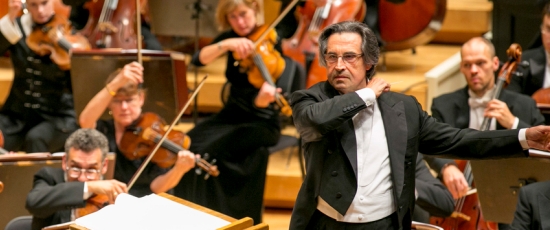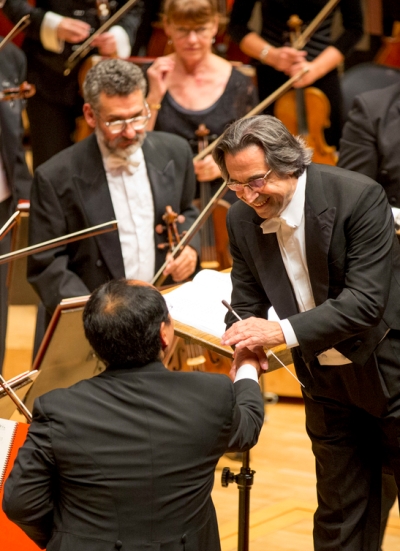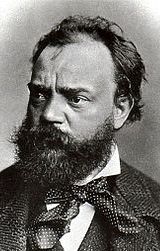Muti and the CSO launch season with a bang sparked by off-beat, over-the-top mix of works
 Review: Chicago Symphony Orchestra; music director Riccardo Muti, conducting. At Orchestra Hall through Sept. 28. ****
Review: Chicago Symphony Orchestra; music director Riccardo Muti, conducting. At Orchestra Hall through Sept. 28. ****
By Lawrence B. Johnson
Symphony orchestra seasons typically open with some form of sizzle, maybe a mix of warhorse masterwork and superstar soloist. But music director Riccardo Muti went the opposite direction, kicking off the Chicago Symphony Orchestra’s new season Thursday night with a complete sleeper of a program, an evening of little-known works and with no soloist at all. It was terrific.
 It’s a rare thing, at least in this country, to hear a concert performance of either Dvořák’s Symphony No. 5 in F major or Respighi’s “Feste romane” (“Roman Festivals,” if you like). The former is something of a Schubertian pastorale, infectiously tuneful and spacious; the latter, mind you from the same hand that produced the popular and rather conservative “Pines of Rome” and “Fountains of Rome” – is fraught with violent clashes of competing bands reminiscent of Charles Ives at his rowdiest.
It’s a rare thing, at least in this country, to hear a concert performance of either Dvořák’s Symphony No. 5 in F major or Respighi’s “Feste romane” (“Roman Festivals,” if you like). The former is something of a Schubertian pastorale, infectiously tuneful and spacious; the latter, mind you from the same hand that produced the popular and rather conservative “Pines of Rome” and “Fountains of Rome” – is fraught with violent clashes of competing bands reminiscent of Charles Ives at his rowdiest.
The Dvořák Fifth Symphony, composed in 1875 when he was 34, displays much the same gentle temperament and effortless melodic content as Schubert’s own Fifth. Yet Dvořák’s fingerprints are distinctively present in the folk dances that constantly hover at the edges, and in the graceful melancholy that flows through the slow movement.
 Muti indulged this ingratiating music on its own terms, allowing its open-hearted tunes to spin out in unshadowed innocence and drawing from the CSO strings a luster that seemed to bathe the symphony in sunlight. One can readily appreciate the greater concision and depth Dvořák was to achieve in the Seventh, Eighth and Ninth Symphonies, but Muti’s sensitive engagement of the Fifth revealed a composer already well along the path to lasting importance.
Muti indulged this ingratiating music on its own terms, allowing its open-hearted tunes to spin out in unshadowed innocence and drawing from the CSO strings a luster that seemed to bathe the symphony in sunlight. One can readily appreciate the greater concision and depth Dvořák was to achieve in the Seventh, Eighth and Ninth Symphonies, but Muti’s sensitive engagement of the Fifth revealed a composer already well along the path to lasting importance.
While Respighi’s “Feste romane” is hardly an obscure work, thanks to recordings, it doesn’t turn up often as concert fare – at least in this country. Muti acknowledged as much in some mirthful comments to the audience before he conducted the work. This last work (1928) in the trilogy with “Fountains of Rome” (1916) and “Pines of Rome” (1924) is, Muti said, by turns “loud, vulgar or very romantic – like Roma.”
 The work’s four sections evoke festivals of the ancient Roman Circus Maximus, a Jubilee, an October Festival and an Epiphany. Think of Mardi Gras four times over, and maybe four times as loud, with all the clashing sounds that rip the air and batter the ear as merrymakers, hawkers and musicians converge into a single wild scene. Muti led a bracing performance of deceptively precision and balance, even as competing sections threatened to lift the roof off Orchestra Hall.
The work’s four sections evoke festivals of the ancient Roman Circus Maximus, a Jubilee, an October Festival and an Epiphany. Think of Mardi Gras four times over, and maybe four times as loud, with all the clashing sounds that rip the air and batter the ear as merrymakers, hawkers and musicians converge into a single wild scene. Muti led a bracing performance of deceptively precision and balance, even as competing sections threatened to lift the roof off Orchestra Hall.
As prelude to Respighi, Muti and company offered a luminous account of Giuseppe Martucci’s six-minute Notturno, written for piano in 1891 and orchestrated 10 years later. It’s hard to believe the composer of this quietly sensuous music never produced an opera. But Muti, opera maestro par excellence, summoned from the CSO a performance of unconstrained lyricism and technical finesse to match.
 The concert will be repeated at Carnegie Hall in New York City on Oct. 5, the last of three different programs on consecutive nights by Muti and the CSO to open Carnegie’s 2012-13 season.
The concert will be repeated at Carnegie Hall in New York City on Oct. 5, the last of three different programs on consecutive nights by Muti and the CSO to open Carnegie’s 2012-13 season.
Related Links:
- Performance location, dates and times: Details at CSO.org
- Exclusive interview – Riccardo Muti on Bruckner: Read it at ChicagoOntheAisle.com
- Exclusive interview – Muti on the conductor’s art: Read it at ChicagoOntheAisle.com
- Exclusive interview – Muti on Mahler and Beethoven: Read it at ChicagoOntheAisle.com
Photo captions and credits: Home page and top: Music director Riccardo Muti led the Chicago Symphony Orchestra in its 2012-13 season debut concert at Orchestra Hall. Descending: Riccardo Muti greets CSO concertmaster Robert Chen as the orchestra opens its season. (Photos by Todd Rosenberg) Antonín Dvořák. Ottorino Respighi. Giuseppe Martucci. Below: Chicago Symphony Orchestra and music director Riccardo Muti on stage at Orchestra Hall for the opening night concert. (Photo by Todd Rosenberg)
Tags: Chicago Symphony Orchestra, Dvorak, Martucci, Respighi, Riccardo Muti


